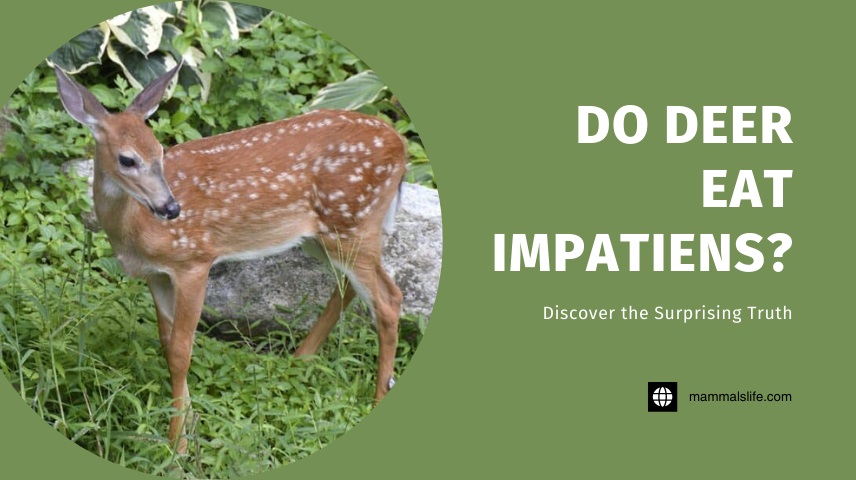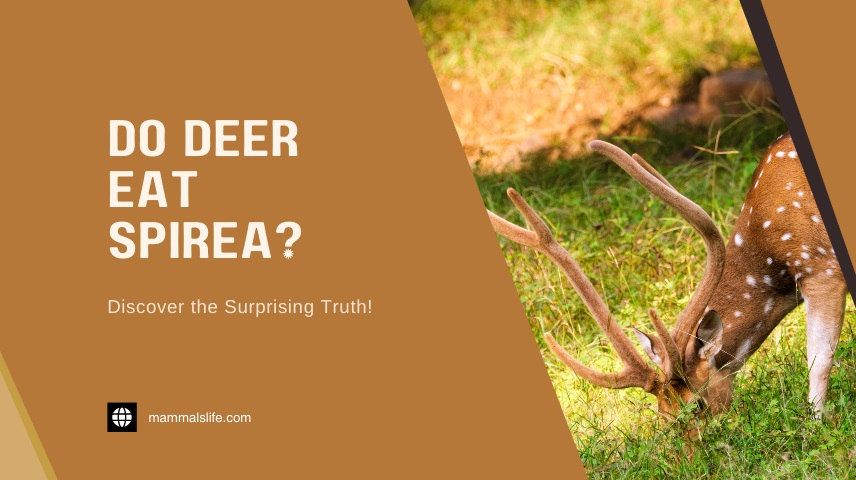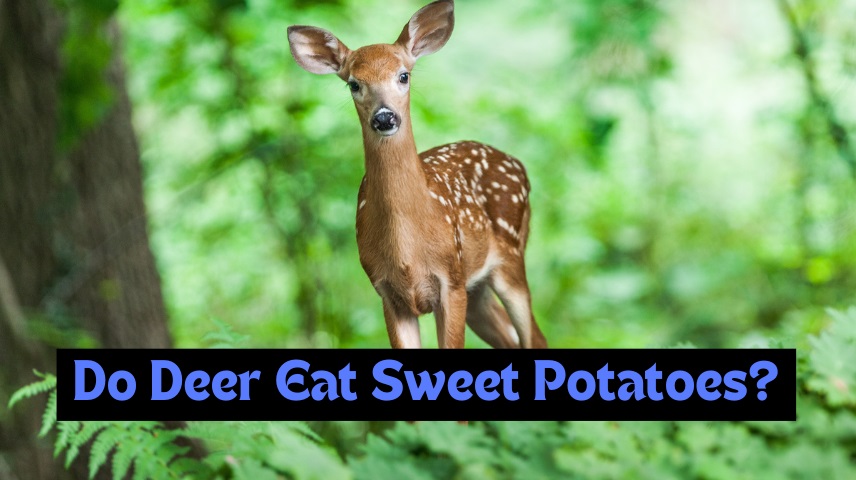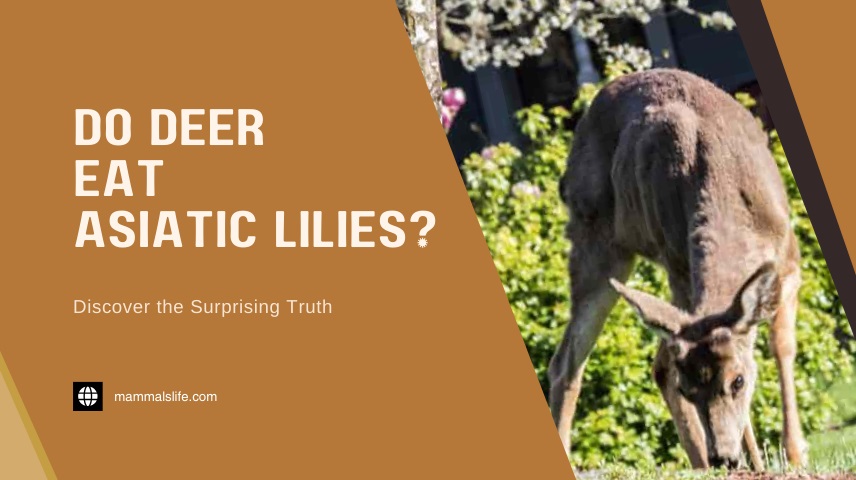Last Updated on February 22, 2025 by Mammals Life
Yes, deer eat impatiens. These plants are among the favorites for deer due to their tender leaves and flowers.
Impatiens, known for their vibrant colors and shade tolerance, often attract deer. Gardeners frequently struggle to keep these plants safe from hungry deer. Understanding deer behavior and their eating habits can help protect your garden. Implementing deer-resistant plants and repellents can deter these animals.
Maintaining a beautiful garden requires strategies to keep deer at bay. Consider using physical barriers or natural deterrents. Deer can cause significant damage to impatiens, affecting their growth and bloom. Regularly monitoring your garden helps in early detection of deer presence. Adopting effective measures ensures your impatiens thrive without deer interference.
Deer And Their Diet
Deer are known for their diverse diet. They consume a variety of plants. Understanding their diet helps gardeners protect their plants. Let’s dive into what deer typically eat.
Common Foods
Deer love to munch on various plants. Here are some common foods:
- Grasses
- Leaves
- Twigs
- Fruits
- Nuts
They also eat flowers and vegetables. Deer have a wide range of preferred plants. Impatiens are one of their favorites. These plants are easy for deer to chew. Gardeners often find their impatiens nibbled.
Seasonal Variations
Deer’s diet changes with the seasons. In spring and summer, they eat fresh greens. They prefer tender leaves and shoots. This includes impatiens, which grow in warmer months.
During fall, deer look for acorns and fruits. They need to store fat for winter. In winter, their diet shifts to bark and twigs. Snow covers most green plants, making food scarce. They eat what they can find, including evergreen plants.
Understanding these patterns helps protect your garden. Planting less palatable plants can deter deer. Using deer repellents can also be effective.
Impatiens: A Popular Garden Plant
Impatiens are beautiful flowers that brighten any garden. They come in many vibrant colors. Gardeners love them for their easy care and versatility. These plants thrive in shady spots, making them perfect for many gardens.
Varieties
There are several types of impatiens. Each has unique features. Here are some popular varieties:
- Impatiens walleriana: Known for its bright colors and bushy growth.
- New Guinea impatiens: These have larger flowers and can handle more sun.
- Impatiens balsamina: Also called balsam, they have a charming, old-fashioned look.
Each variety adds unique beauty to your garden. Choosing the right type depends on your garden’s conditions.
Growing Conditions
Impatiens need specific conditions to thrive. Here are the key factors:
| Condition | Requirement |
|---|---|
| Light | Partial to full shade |
| Soil | Well-drained, rich in organic matter |
| Water | Keep soil consistently moist |
| Temperature | Warm, but not too hot |
By meeting these needs, your impatiens will flourish. Healthy plants also resist pests better.
Do Deer Eat Impatiens?
Gardeners often wonder if deer eat impatiens. These colorful flowers brighten gardens. But deer might eat them. This section explores that topic.
Observations
Many gardeners have noticed that deer visit their gardens. Deer seem to nibble on impatiens. This happens often in rural areas. Some say deer avoid impatiens. Others find the flowers eaten. This shows mixed results.
Scientific Studies
Scientific studies help understand deer behavior. Studies show deer have varied diets. Deer might eat impatiens in some areas. In other areas, they ignore them. Research shows deer prefer some plants over others.
| Plant | Deer Preference |
|---|---|
| Impatiens | Moderate |
| Hostas | High |
| Marigolds | Low |
Based on studies, deer eat impatiens sometimes. But they like other plants more. Deer behavior varies by region. Some deer find impatiens tasty. Others do not. This makes it hard to predict.
- Deer have mixed preferences.
- Deer behavior varies by location.
- Impatiens might be eaten in some gardens.
Understanding deer preferences helps. It lets gardeners protect their plants. Knowing deer might eat impatiens is useful. It helps in garden planning.
Why Deer Are Attracted To Certain Plants
Deer are naturally drawn to impatiens due to their appealing taste and tender texture. These vibrant plants provide a tempting snack, especially in gardens where food options may be limited.
Deer often roam gardens and munch on plants. They have specific reasons for choosing certain plants over others. Understanding these reasons can help protect your garden from these gentle grazers.
Nutritional Needs
Deer need to eat a variety of plants to stay healthy. They look for plants rich in vitamins and minerals. Impatiens offer just that. These flowers are full of nutrients. Deer find these nutrients essential for their diet.
| Plant | Nutrient Content |
|---|---|
| Impatiens | High in vitamins and minerals |
| Grass | Low in nutrients |
Deer need high-energy food sources. Impatiens provide the energy they require. This makes them a popular choice for deer.
Scent And Taste
Deer have a strong sense of smell. They are attracted to the scent of certain plants. Impatiens have a pleasant aroma. This scent draws deer to them.
Deer also have taste preferences. They prefer sweet and tender plants. Impatiens are tender and have a mild, sweet taste. This makes them appealing to deer.
- Strong sense of smell
- Attracted to sweet and tender plants
- Impatiens have a mild, sweet taste
Understanding why deer are attracted to certain plants can help you plan your garden better. Choose plants that deer are less likely to eat. This will protect your beautiful impatiens and other beloved plants.
Protecting Your Garden From Deer
Deer can be a gardener’s worst enemy. They love to munch on many plants, including impatiens. To keep your garden safe, you need effective strategies. Here are some solutions to protect your precious plants from these hungry visitors.
Fencing Solutions
A strong fence can keep deer out of your garden. It is one of the most effective methods.
| Fence Type | Height | Pros | Cons |
|---|---|---|---|
| Wooden Fence | 8 feet | Sturdy and durable | Expensive |
| Electric Fence | 6-8 feet | Effective deterrent | Requires maintenance |
| Mesh Fence | 7-8 feet | Cost-effective | May need frequent repairs |
Natural Deterrents
Natural deterrents can help keep deer away from your garden. These methods are safe and eco-friendly.
- Planting deer-resistant plants: Choose plants like lavender or marigolds.
- Using scents: Deer dislike strong smells. Use garlic or soap shavings.
- Motion-activated sprinklers: Spray water when deer come close.
- Noise makers: Hang wind chimes or use ultrasonic devices.
Combining these methods can make your garden a deer-free zone.
Alternative Deer-resistant Plants
Deer often feast on delicate flowers like impatiens, leaving gardeners frustrated. But worry not! There are many beautiful and deer-resistant plants to choose from. These plants will keep your garden vibrant and safe from deer. Explore the options below to find the perfect fit for your garden.
Flowering Options
Here are some flowering plants that deer usually avoid:
- Lavender: This plant has a strong scent that deer dislike.
- Marigolds: Bright and cheerful, marigolds are also deer-resistant.
- Snapdragons: These come in many colors and are not favored by deer.
- Foxglove: Tall and elegant, foxglove flowers keep deer away.
These flowers not only deter deer but also attract butterflies and bees. Enjoy a lively, colorful garden without the worry of deer damage.
Foliage Choices
For those who prefer lush greenery, here are some foliage plants that deer tend to ignore:
- Hostas: These come in various sizes and shades, perfect for a lush garden.
- Ferns: Their texture and appearance make them unappealing to deer.
- Boxwood: This evergreen shrub provides year-round greenery and is deer-resistant.
- Dusty Miller: Its silvery leaves add a unique touch and repel deer.
Foliage plants can add texture and depth to your garden. They also require less maintenance compared to flowering plants.
Consider mixing both flowering and foliage plants for a balanced and beautiful landscape. This approach ensures you have color and greenery throughout the year.
Frequently Asked Questions
Do Deer Eat Impatiens Flowers?
Yes, deer often eat impatiens flowers because they are tender and tasty.
How To Protect Impatiens From Deer?
Use deer repellents, fencing, or plant deer-resistant flowers around impatiens to protect them.
Are Impatiens Deer-resistant?
No, impatiens are not deer-resistant and are frequently eaten by deer.
What Plants Deter Deer From Eating Impatiens?
Plants like lavender, marigolds, and rosemary can deter deer and protect your impatiens.
Conclusion
Deer love to munch on impatiens, making them a risky choice for gardens. Plant deer-resistant flowers instead. Protect your garden with fences or repellents. Understanding deer behavior helps maintain a beautiful garden. Happy gardening and keep those impatiens safe!











